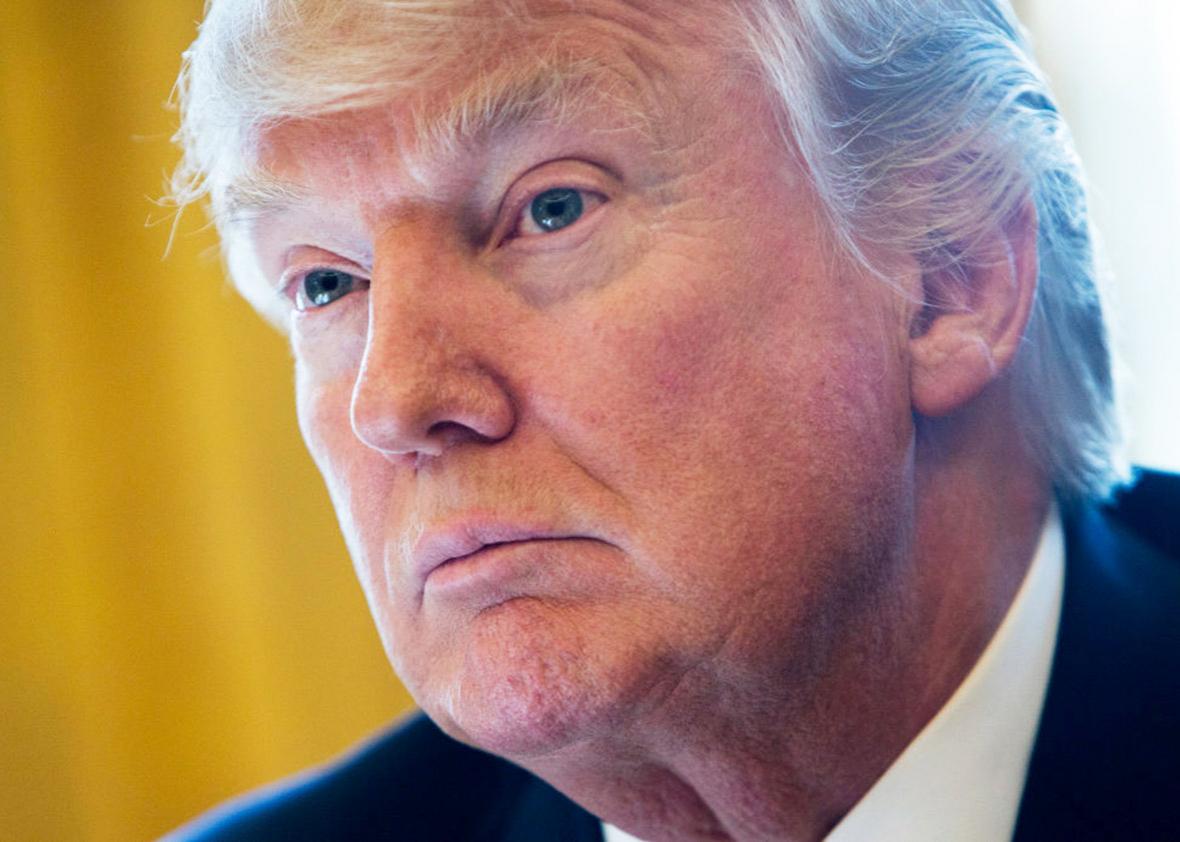Donald Trump’s name barely came up in Tuesday’s hearing before the 9th U.S. Circuit Court of Appeals. But the hearing, which concerned Trump’s temporary ban on travel to the United States from seven Muslim countries, was completely colored by his alarming behavior. In 18 months as a candidate, two more as president-elect, and two weeks as president, Trump has compiled a record of prejudice, deception, and bad judgment. That record is killing him in court.
The Justice Department came into the hearing with two problems. One was Trump’s weak basis for targeting the seven countries (Iraq, Iran, Libya, Somalia, Sudan, Syria, and Yemen) on security grounds. The other problem was strong evidence that Trump has a general beef with Muslims. At a district court hearing on Friday, the Justice Department argued unsuccessfully that both issues should be ignored, in deference to the president’s judgment and his assertions of benign motivation. In Tuesday’s clash, the department fared no better.
Michelle Friedland, one of three 9th Circuit judges hearing the case, asked for evidence to support Trump’s executive order. August Flentje, the Justice Department lawyer arguing the appeal, replied by citing “findings” written into the order by Trump’s aides—for example, “that numerous foreign-born individuals have been convicted or implicated in crimes since Sept. 11.” The vague reference to foreigners didn’t impress the panel. Friedland asked for evidence linking the seven banned countries to terror attacks. Flentje couldn’t find it in the record. “These proceedings have been moving very fast,” he pleaded.
Flentje pointed out that Congress and the Obama administration had restricted visa waivers to the seven countries based on concerns about terrorism. But that observation was soon turned against him. Judge Richard Clifton asked Flentje for evidence that the visa crackdown hadn’t solved the problem: “Is there any reason for us to think that there’s a real risk or that circumstances have changed such that there would be a real risk, if existing procedures [stayed] in place?” Flentje, unable to give a reason, appealed to Trump’s authority: “The president determined that there was a real risk.” Judge William Canby cited the Justice Department’s inability in district court to name a federal terror offense by anyone from the targeted countries. Flentje said it didn’t matter. Only the president, he declared, could judge “the level of risk that is acceptable.”
The evidence of Trump’s animus against Muslims was as damning as the lack of evidence for the security threat. Washington state Solicitor General Noah G. Purcell pointed to “public statements from the president and his top advisers” that conveyed “intent to discriminate against Muslims.” The statements, detailed in briefs, included Trump’s call for a “complete shutdown of Muslims entering the United States,” the Trump team’s explanation (delivered by surrogate Rudy Giuliani) that the executive order had evolved from that proposal, and Trump’s Jan. 27 pledge to help Christian refugees in particular. Flentje had no answers. “The best evidence of the intent of the president,” he insisted, was what Trump had professed in the executive order, not what Trump had said before or afterward. “That is the end of the inquiry,” the lawyer decreed.
In Trumpian style, Flentje concluded the hearing with an attack on the media. “It is extraordinary for a court to enjoin the president’s national security determination based on some newspaper articles,” he fumed. Apparently, this was a reference to articles and transcripts submitted by the state of Washington as documentation of Trump’s anti-Muslim statements. Flentje called this reliance on journalism a “very troubling second-guessing of the national security decision made by the president.” Clifton seemed taken aback: “Do you deny that in fact the statements attributed to then-candidate Trump and to his political advisers, and most recently Mr. Giuliani—do you deny that those statements were made?” Flentje didn’t deny them, but he suggested the court shouldn’t “look at campaign statements.” Clifton replied that reality still mattered: “Either those kind of statements were made, or they’re not.”
The judges’ demands for evidence didn’t please Trump. In a speech to police chiefs on Wednesday morning, he said he had watched the hearing and was disgusted. Trump accused the court of playing politics. His rant, which went on for several minutes, echoed his denunciations of the “so-called judge” in the district court and the “Mexican” judge who had presided over Trump’s fraud case. “Courts seem to be so political,” the president complained.
But the reason Trump has more trouble in courts than in elections is that courts are largely apolitical. They expect reasoning and facts. The games Trump got away with last year—dressing up prejudice, dismissing media reports, telling everyone to “believe me”—don’t impress judges. On the contrary, these behaviors undermine his credibility. Trump has earned a reputation as a bigot, liar, rationalizer, and abuser of power. He’s right that many courts will look hard at the travel ban and other executive orders, in part because of who the president is. And they should.
